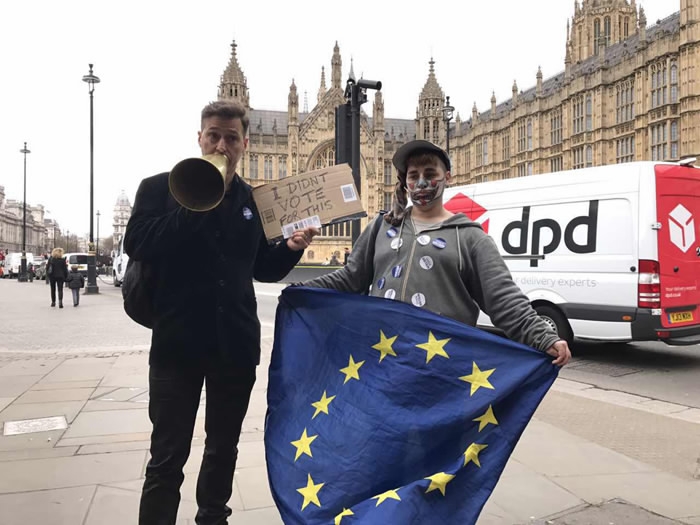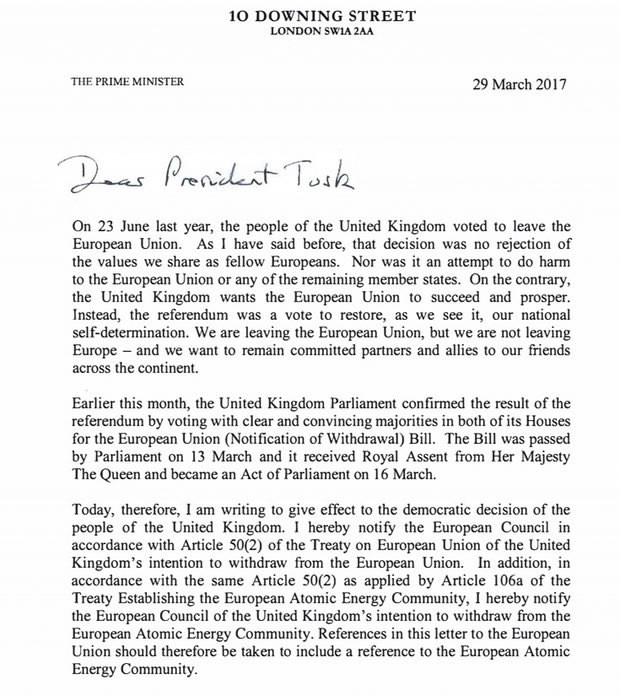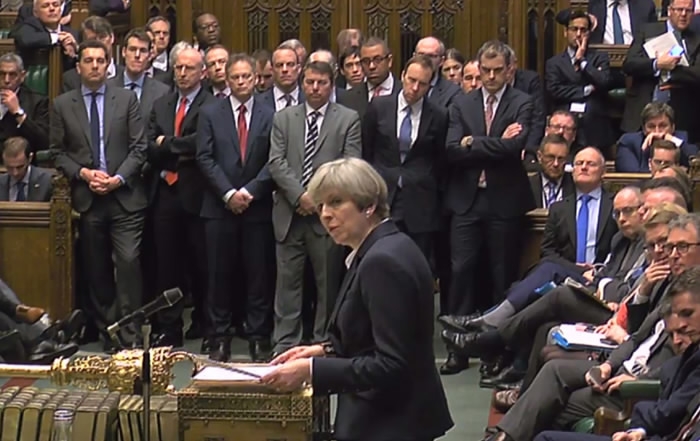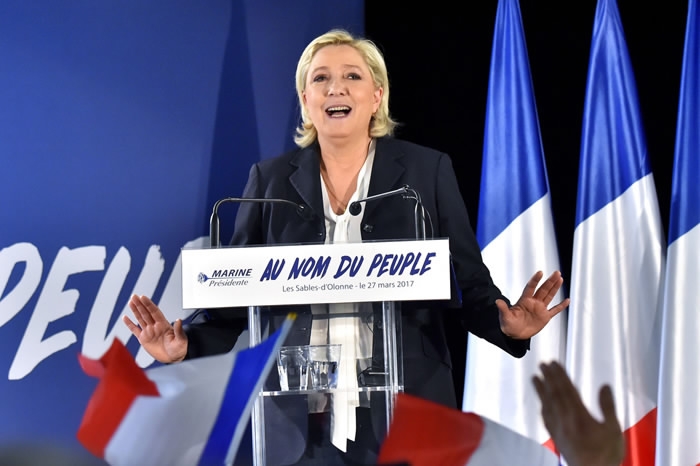"This is an historic moment from which there can be no turning back," British Prime Minister Theresa May said in a statement in the House of Commons on Wednesday, after the letter officially confirming the UK's intention to leave the European Union was delivered to President of the European Council Donald Tusk by Sir Tim Barrow, the UK's ambassador to the EU. Tusk confirmed receiving the letter on Twitter, saying "After nine months, the UK has delivered."

People protest against Brexit outside the Houses of Parliament in London, UK on March 29, 2017. /CGTN Photo
Upon receiving the letter, Article 50 of the Lisbon Treaty has been triggered, starting a two-year process for the UK and the remaining 27 member states to negotiate an exit deal.
In her speech to parliament, May said her government has acted on "the democratic will of the British people" and "the clear and convincing position of this House."

The first page of the letter officially confirming the UK's intention to leave the EU. /CGTN Photo
She added that Britain would now make its own decisions and its own laws and "take control of the things that matter most to us – and we are going to take this opportunity to build a stronger, fairer Britain, a country that our children and grandchildren are proud to call home."
She told members of parliament that this marks "the moment for the country to come together" and promised to "represent every person in the whole United Kingdom" during the negotiations.

British Prime Minister Theresa May makes a statement in the House of Commons in London, UK, after the letter invoking the provisions of Article 50 of the Lisbon Treaty was delivered to the EU. /CFP Photo
The triggering of Article 50 comes just one day after the Scottish parliament backed First Minister Nicola Sturgeon's call for a second independence referendum. May is widely expected to insist that if a referendum vote – which could break up a union that has been in place for 310 years – does take place, it must do so after the UK has left the EU.
Across the Irish Sea in Northern Ireland, there is fear and trepidation among republicans and unionists alike that Brexit will mean a return to the days of a hard border with the Republic of Ireland to the south, putting 1998's Good Friday Agreement and the entire peace process under immense pressure.
President of the European Council Donald Tusk holds the letter invoking Article 50 of the Lisbon Treaty in Brussels, Belgium, on Wednesday, March 29, 2017.
Following the move, May is set to publish details of the Great Repeal Bill. The bill will transfer EU laws into British law, scrapping the European Communities Act 1972 and putting an end to the applicability of EU law in the UK. On Friday, Tusk is set to publish the negotiation guidelines for EU member states, which are set to be adopted at the EU Summit on April 29.
The triggering of Article 50 was called "the point of no return" by former UKIP leader Nigel Farage in an interview with BBC, who campaigned for Brexit, with last year's referendum widely celebrated by populist politicians around Europe.

A boy joins protesters from Open Britain as they demonstrate outside the Houses of Parliament in London, UK on March 29, 2017. /CFP Photo

CGTN Graphic
Indeed, 2017 is set to be a tumultuous year in politics across the continent.
In France, Front National leader Marine Le Pen is widely expected to make the second round of presidential elections due to be held in April and May, after a campaign that has seen her call for an end to the euro currency and a nationwide "Frexit" referendum.

French presidential candidate for the populist Front National party Marine Le Pen delivers a speech during a campaign meeting in Les Sables d'Olonne, western France on March 27, 2017. /CFP Photo
Later in the year, on September 24, voters in Germany will head to polling stations to cast their votes in parliamentary elections, with Angela Merkel seeking a fourth term as chancellor. However, amid criticism of her open-door policy towards migrants, populist parties such as Alternativ für Deutschland have been on the rise and will be looking to take advantage of growing discontent against Merkel's policies.
Related news:









